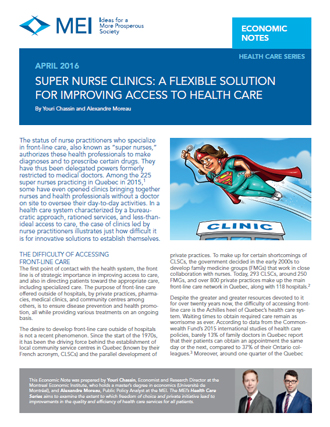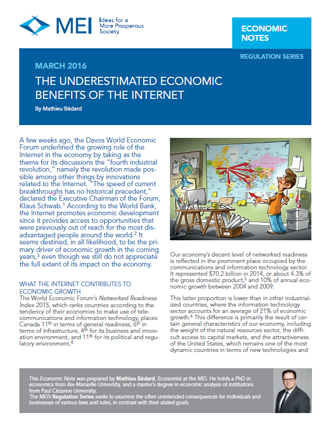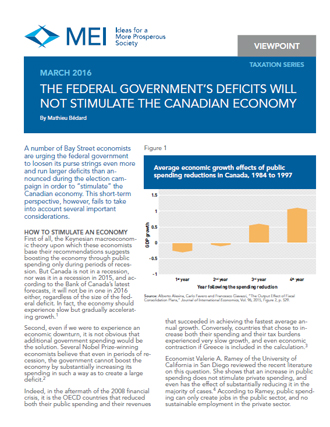
5-minute read
The Benefits of Pharmaceutical Innovation: Health, Longevity, and Savings
Although the costs of new pharmaceuticals are often the subject of critical media coverage, they are rarely juxtaposed with the benefits that these new drugs bring. Among other things, new research presented in this Research Paper investigates the impact that pharmaceutical innovation had on utilization of hospital care by cancer patients in Canada from 1995 to 2012.

15-minute read
The Most Efficient Way to Stimulate the Economy: Private Pipelines or Public Infrastructure?
The public debates over pipelines have focused especially on their safety, on environmental risks, and on economic spinoffs. These are relevant questions, but they are often considered from a local point of view instead of from a pan-Canadian perspective. This Economic Note examines the four pipeline projects currently being studied and focuses on their economic impact for Canada as a whole by contrasting them with the effects of public infrastructure investment.

8-minute read
Viewpoint – Less Regulation and More Competition to Curb Corruption
There have been several corruption scandals in Quebec and in the rest of Canada in recent years. Corruption is a problem that affects all countries and all societies, but it is much more prevalent in certain regions than in others. Economic analysis has several things to teach us about these disparities and about economic principles that can check this scourge.

8-minute read
Viewpoint – Funding Hospitals Based on Services Rendered
Quebec’s Health Minister, Gaétan Barrette, recently announced that the government wanted to transform the funding method for medical facilities in the health network by adopting activity-based funding, a model which the MEI has analyzed a number of times in recent years and which is the norm in most industrialized countries. This is a step in the right direction when it comes to reducing waiting times in Quebec hospitals.

7-minute read
Viewpoint – Food-Truck Freedom for Montreal
Since 2013, there has been a loosening of the decades-long ban on mobile food vending in Montreal. Such steps place Montreal squarely within a wider movement throughout North America to allow greater entrepreneurship at the municipal level. In spite of this positive step, however, the large potential benefits to both consumers and workers are being undermined by heavy regulation. This Viewpoint highlights those benefits and explains how the regulatory framework surrounding mobile food vendors in Montreal remains much too constraining.

9-minute read
The State of Competition in Canada’s Telecommunications Industry – 2016
The federal government and the CRTC should not repeat the mistakes of recent years by intervening in the broadband sector as they have in the wireless sector, argues the MEI in the 2016 edition of a Research Paper entitled The State of Competition in Canada’s Telecommunications Industry. The Paper notes that 96% of Canadian households already had access to download speeds of 5 Mbps in 2014, with 77% of households subscribing to such a service, a trend that has shown strong growth in recent years.

15-minute read
Super Nurse Clinics: A Flexible Solution for Improving Access to Health Care
Quebec’s Health Department is senselessly blocking the opening of clinics run by nurse practitioners who specialize in front-line care. Yet these doctorless clinics would respond to real needs among the population, access to front-line care being one of the main failings of Quebec’s health system. Moreover, a nurse practitioner costs the health care system around 1/3 of what a general practitioner costs, shows an Economic Note published by the MEI.

12-minute read
The Underestimated Economic Benefits of the Internet
A few weeks ago, the Davos World Economic Forum underlined the growing role of the Internet in the economy by taking as the theme for its discussions the “fourth industrial revolution,” namely the revolution made possible among other things by innovations related to the Internet. According to the World Bank, the Internet promotes economic development since it provides access to opportunities that were previously out of reach for the most disadvantaged people around the world.

6-minute read
Viewpoint – Does Canada Really Have the Leeway to Take on More Debt?
In the introduction to its budget plan tabled earlier this week, Canadian Finance Minister Bill Morneau announced a deficit of $29.4 billion for the 2016-2017 year, or $1,631 per net taxpayer, and total deficits of $113 billion over the next five years. One of the arguments raised in the document in favour of this substantial new debt is that Canada’s current overall debt is much lower than that of the other G7 countries, which gives the federal government the leeway to take on more debt. However, this comparison is based on the net debt, which distorts the situation.

7-minute read
Viewpoint – The Federal Government’s Deficits Will Not Stimulate the Canadian Economy
A number of Bay Street economists are urging the federal government to loosen its purse strings even more and run larger deficits than announced during the election campaign in order to “stimulate” the Canadian economy. This short-term perspective, however, fails to take into account several important considerations.

